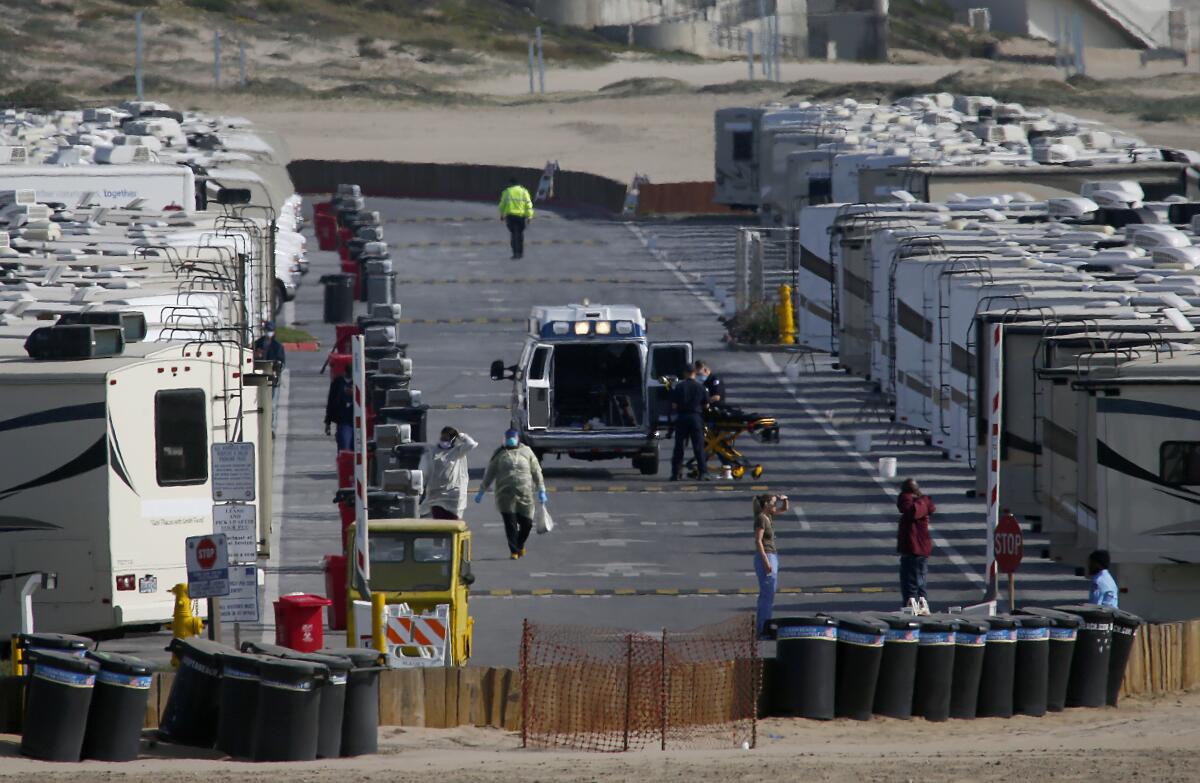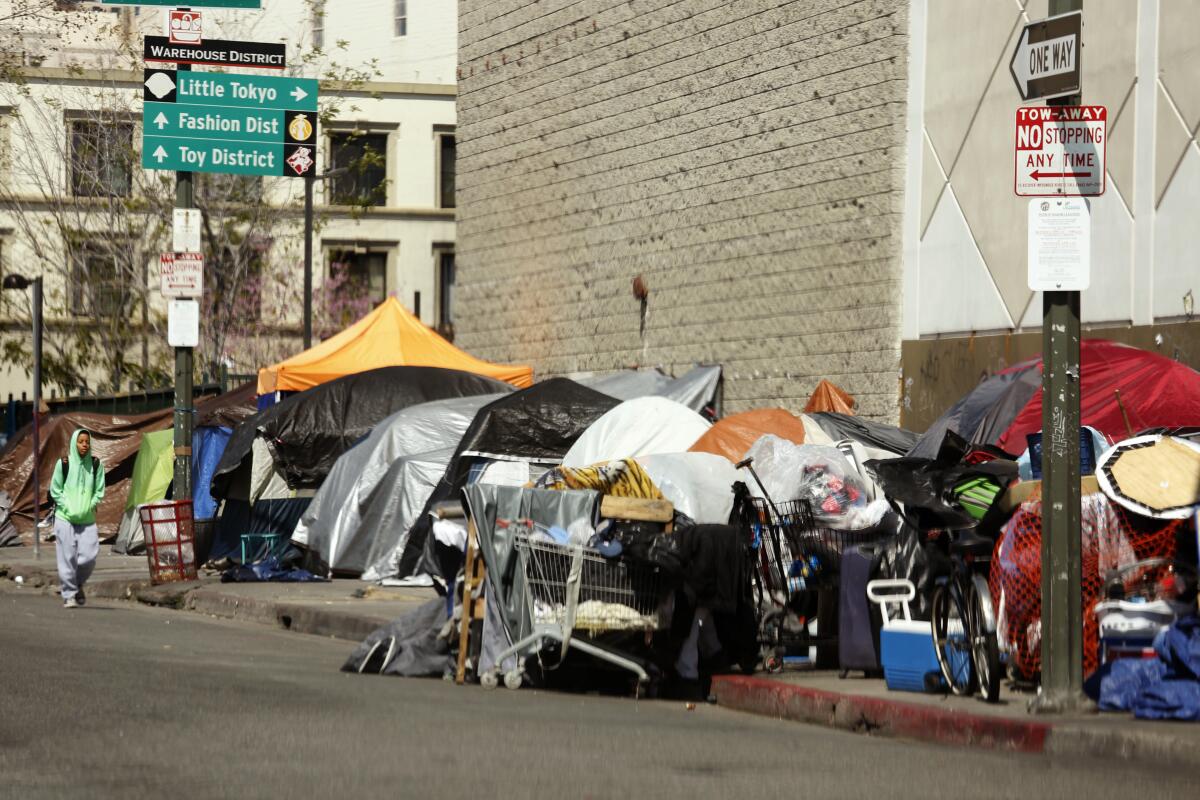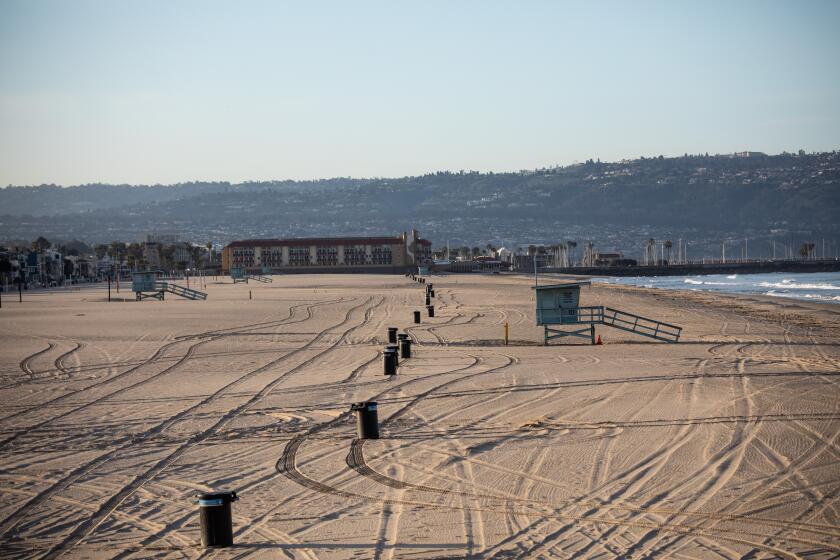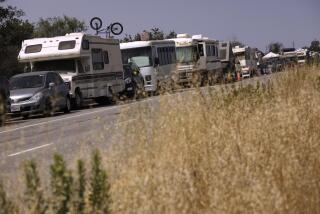Inside L.A.’s scramble to open shelters and find hotel rooms for coronavirus patients

- Share via
As Los Angeles prepares for a storm of coronavirus cases, efforts to get homeless people off the streets and to secure rooms for patients to stay without risk of infecting others are off to an uneven start.
So far, Los Angeles County’s hastily compiled network of quarantine and isolation sites have largely remained empty, while its plan to add thousands of beds in hotels and motels is just getting underway.
The city’s 13 new homeless shelters, meanwhile, were 95% full on Wednesday, according to Mayor Eric Garcetti’s spokesman Alex Comisar. The mayor’s office opened the shelters inside city recreation centers in the past few days and, since then, has been hustling to convert more in hopes of lowering the threat of the virus spreading among the high-risk population in encampments.
After workers accounted for the space required for proper social distancing, as recommended by the Centers for Disease Control and Prevention, the city had to back off projections that its first 13 shelters would be able to accommodate about 1,600 people. The city found there was only room for 563 cots.
An additional 13 shelters are expected to be ready by the end of the week, Comisar said, but he could not say what their capacity would be. Initially, Garcetti said that 42 recreation centers would be converted into shelters with a total of 6,000 beds.
“The process of figuring out how many beds is a case by case thing happening in real time,” Comisar said.
As the city has moved homeless people off the streets, county officials have been working to secure thousands of beds both for shelters and for isolation or quarantine.
The L.A. County Office of Emergency Management, which is responsible for providing space for patients to quarantine or isolate themselves, had 460 rooms ready this week — including 112 trailers at Dockweiler State Beach — and is preparing to open another 442 rooms. Only 51 people were using them as of Tuesday. More will be used as more people are confirmed to have COVID-19 or possible exposure to the disease, the agency’s Director Kevin McGowan said.
“We continue to prepare for additional capacity,” McGowan said. “Our goal is to build capacity prior to the need of that capacity but do it in a measured approach.”
Finding beds for homeless people, needed to help get those at the highest risk off the street and to free up enough space at other shelters to ensure there’s room for social distancing, has been a slower process.
Most are being secured in hotels and motels that have lost business because of the pandemic. The Hotel Assn. of Los Angeles announced last week that more than 115 hotels have offered at least 10,000 rooms as temporary housing, either for homeless people or those needing quarantine or isolation.
The first, a hotel in West Los Angeles, is set to open Friday, said Phil Ansell, director of the county’s Homeless Initiative. At least seven, including the West L.A. hotel, will be ready by next week with a total of 664 rooms.
In addition, state negotiators were close to reaching deals to use seven more hotels with nearly 600 rooms. Ansell would not predict how many rooms would ultimately be secured for use, but said the need is far from being met.
“From where we are now to where we need to get to, we got a long way to go,” he said. “Dozens of sites and thousands of beds.”
Reggie Dominguez spent days self-isolating in a hospital parking lot, homeless and worried he had coronavirus. There are many more like him on skid row.
County officials are not disclosing the names of the hotels being opened to discourage people from showing up uninvited, Ansell said. All admissions will come from service providers and shelters that need to reduce crowding.
The shelter expansion will require a major staffing deployment.
The Los Angeles Homeless Services Authority, which will be responsible for operating the hotel rooms secured by the county, has turned to its biggest providers — St. Joseph Center in Venice and LA Family Housing — to run two expected to open this week.
Ansell said the Los Angeles County Fire Department also has agreed to help organize the “logistically massive enterprise.” City and county employees, some of whom have been trained in disaster response, will switch from their regular jobs to help out.
In the meantime, LA Family Housing has stopped taking new homeless residents at its Taper Bridge Housing facility in North Hollywood. It has converted its community and computer rooms into sleeping areas and set 15-minute meal times, President and CEO Stephanie Klasky-Gamer said. Also, she said some existing residents will be sent to a newly leased hotel in Canoga Park when it opens later this week.

But there were hiccups in the roll out of the shelters at city recreation centers, including the deployment of Los Angeles police officers riding in buses to pick up homeless people when the county said it couldn’t spare health workers to screen people for flu-like symptoms.
There was some resistance to the officers’ presence, but outreach workers were “able to communicate to our clients that’s OK,” Klasky-Gamer said.
Others were turned away. At Pan Pacific Park Recreation Center, which has been turned into a shelter in Fairfax, at least one homeless man who is a regular there said he was initially denied access to the shower facility because the shelter was full.
“Outside men’s room [is] not functioning. Can’t wash hands inside,” Terrance Whitten said in an email. “If you’re not registered for [a] bed, then tough.” By Tuesday, Whitten said officials were allowing him and other regulars to sign up to access the showers.
But the rush to open new shelters and the overwhelming response from homeless people was heartening to some, a possible silver lining to the pandemic.
Local health officials give catastrophic estimates of potential coronavirus deaths if stay-at-home orders aren’t followed.
“It’s unforeseen tragedy and opportunity,” said Va Lecia Adams Kellum, president and CEO of St. Joseph Center in Venice. “We’ve never had adequate shelter and interim housing. What we’re doing right now is scaling up overnight.”
Randall Kuhn, a professor at the UCLA Fielding School of Public Health, said there has been an unexpected shift in thinking about the value of investing in shelters for homeless people, not just permanent housing.
“COVID-19 has done that work for us in under a week,” Kuhn said via email, referencing a recent report that he co-wrote. “Now ... we can imagine a reality in which everyone is quickly sheltered (safely) and then must be moved to permanent housing as part of the next phase.”
More to Read
Sign up for Essential California
The most important California stories and recommendations in your inbox every morning.
You may occasionally receive promotional content from the Los Angeles Times.












